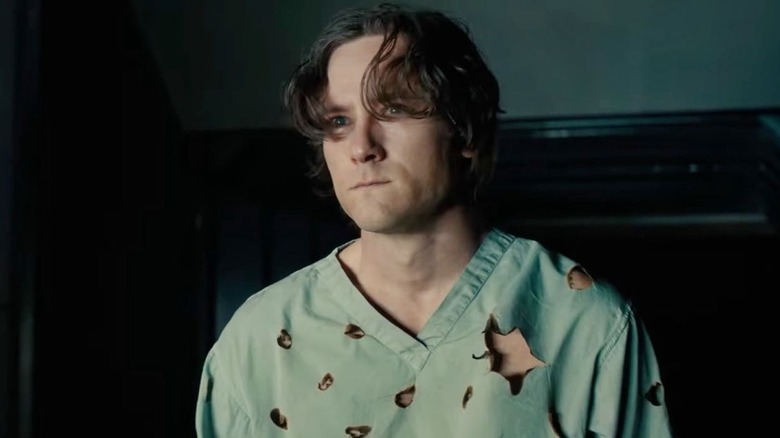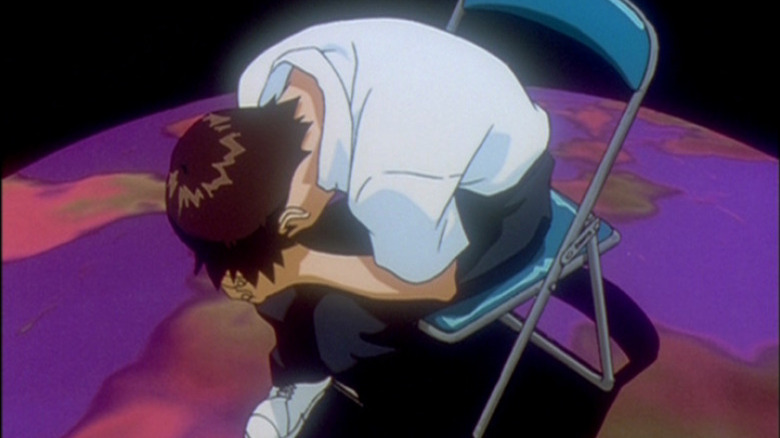Marvel's Thunderbolts Just Remade One Of The Most Controversial Anime Endings Ever
You mustn't run away, unless you haven't seen "Thunderbolts*" and also "Neon Genesis Evangelion," in which case step out of the robot, because there are heavy spoilers ahead for both.
"Thunderbolts*" is one of the biggest surprises Marvel Studios has delivered in years. This is a team-up movie the likes of which we haven't seen in a while, with a big focus on character dynamics, humor that stems from those dynamics, and — much like "Guardians of the Galaxy" — a collection of memorable and lovable losers forced to work together and save the day. It is a reminder of the best the Marvel Cinematic Universe has to offer, and what made this universe last this long — team-ups straight out of the comics.
The film follows a group of mercenary rejects with powers who find themselves betrayed by their employer, so they decide to team up and get revenge, before facing the destruction of all of New York City. What makes this stand out even from team-up movies is how emotional and mature the "Thunderbolts*" is. These guys are not heroes and they don't work together for the greater good, but because it's the only way they can survive this dark world. To paraphrase "Lost" star Matthew Fox's Jack Shephard, if they can't live together, they're going to die alone.
Then we have Bob (Lewis Pullman), a seemingly ordinary dude with no skills, but plenty of mental health issues. Unfortunately for, well, everyone, Bob was the subject of a super soldier procedure that turns him into the superpowered being Sentry, giving his darker impulses an avenue to emerge as a distinct personality, and go to town turning every single person in New York into human shadows like the ones in the aftermath of the Hiroshima atomic bombing.
It is a creative way to have high stakes without doing the infamous sky beam that was so prominent in early 2010s superhero movies. And yet, instead of a big brawl against the villain to showcase the titular Thunderbolts' ability to work together and use their powers in sync, the climax of "Thunderbolts*" takes a more introspective look amidst the widespread mayhem. In essence, it's the ending of "Neon Genesis Evangelion."
The finale of Thunderbolts* is refreshingly introspective
Rather than fighting Sentry in the air with fists and powers, crashing through buildings and throwing laser beams around, the climax of "Thunderbolts*," and the fight against the seemingly invincible superpowered villain, is mostly just a talk inside Bob's mind. Yelena (Florence Pugh), recognizing that Bob is in as much pain as her, decides to let him turn her into a shadow, which transports her to another dimension, seemingly inside his mind. There, Yelena and Bob have a chat about mental health, trauma, and the need to rely on people around you to get out of the pit.
Having the big fight against the villain not just be a discussion, but essentially a therapy session, is a brilliant choice, and something straight out of Hideaki Anno's masterpiece, "Neon Genesis Evangelion." That anime, which started out as a rather cool deconstruction of and homage to tokusatsu and mecha anime, quickly turned its attention away from flashy, stunning fights to becoming rather introspective. This went so far as to have the final two episodes of the anime take place entirely within protagonist Shinji Ikari as he ponders the nature of existence, his sense of self, and whether he wants to live in this world. It remains one of the most controversial, polarizing, and talked-about finales in the history of television, regardless of medium. This was creator Hideaki Anno working through his own depression, resulting in an incredibly personal finale to one of the best anime of all time, and a gobsmacking way to resolve a character arc in a way that felt epic yet intimate.
Seeing "Thunderbolts*" pull a similarly introspective climax, where the characters talk through their issues rather than beat each other senseless, is one of the best things Marvel has ever done. All it was missing was a scene where the characters stood around Bob saying "Congratulations!"
But what makes the climax work so well is that we are fully aware of the apocalypse happening. It's not just that we're inside Sentry's mind as he works through his mental health issues, it's the fact that Human Instrumentality is happening right outside.
Sentry unleashes Human Instrumentality
You see, while Shinji was having his mental breakdown and pondering whether he wanted to keep living, the outside world was going through armageddon itself. In short, an apocalyptic event called the Third Impact had begun, with the goal of initiating Human Instrumentality — a pseudo-Biblical process where the souls of every living being would converge into a single consciousness, liberating people from their insecurities, their shames, their flaws. We don't really see this in the anime series, but rather in the alternate/complementary ending "The End of Evangelion," wherein every single human on Earth is horrifically and gruesomely turned into a Tang-like orange liquid. It's an ending many fans thought they wanted to see, the epic end of the world that was teased in the anime but we never got to see due to budget issues, but also a much darker, bleaker, more nihilistic ending than anyone could have anticipated. "The End of Evangelion," when looked at on its own, separated from the uplifting ending of the anime, is one of the meanest (and also best) anime movies of all time.
Watching Sentry turn most of the city of New York into shadows, obliterating every human being like they're nothing, erasing them from existence, is reminiscent of the Third Impact sequence in "The End of Evangelion." Neither scene works as well on its own, neither the apocalyptic attack on New York nor the introspective therapy session. Together, though? It's an incredible way of ending a mainstream superhero movie. That in the middle of an apocalyptic event, the Thunderbolts' best idea to defeat the villain is to just go talk to him and help him work through his issues is much better than any fight could be. Likewise, it's knowing that the world is being annihilated in a horrible way while Shinji is contemplating his own life, and also whether to end or save the world, that makes the story of "Evangelion" one of the great achievements of anime.


